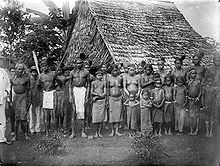Alfuren

Alfuren , also Halifuren, Alifura; is an outdated collective name for a large number of ethnic groups that live on the Moluccas and other islands of eastern Indonesia . In a broader sense, the term denoted the old Malay , Melanesian or Papuan traditional culture there. So there is no ethnological classification associated with “Alfuren”. As a limitation, the indigenous people of the region who settled in the retreat areas as hunters and gatherers at a low level of civilization were given this name.
The term, which originated in the Portuguese colonial period, meant disparagingly "forest people". Alfred Russel Wallace interpreted in the 1860s a “mixed population” between the western Malay and the eastern Papuan peoples, who settled east of the biogeographical dividing line named after him, as “Alfuren”.
The origin of the word is not clear. It was derived from the Portuguese forro (forrar) and Spanish horro (horrar) , which both translate as “free” and go back to the Arabic harr with the same meaning. The Arabs would have added the Arabic definite article al- to the forro . Another suggestion brought the article al- together with the Portuguese fora (“outside”), meaning “those who live outside in the forest”. However, the word furu, fefuru or fufuru also occurs in some regional languages, where it can mean “wild”. Alfuren can also be derived from the self-designation of the Papuan people Arfu in northwest New Guinea . Perhaps in colonial times the name of a wild and feared tribe was transferred to all other unknown mountain peoples.
Early reports from the colonial era describe the “Alfurs” as being superficially Islamized, not or only slightly Christianized and generally with their own religion, which knows a creator god, which is differently named in different regions. If the societies were divided into stages of development and moral categories were applied to the natives living “in the natural state”, those who opposed the civilization processes that initially came from outside in the form of proselytizing were considered “wild” and “defiant”.
Individual evidence
- ↑ Chris Ballard: 'Oceanic Negroes': British anthropology of Papuans, 1820–1869. (PDF; 1.9 MB) In: Bronwen Douglas, Chris Ballard (Eds.): Foreign Bodies: Oceania and the Science of Race 1750–1940. ANU E Press, Canberra 2008, p. 184
- ↑ Adolf Bernhard Meyer : About the names Papúa, Dayak and Alfuren. Karl Gerolds Sohn, Vienna 1882, pp. 13–15. Online at papuaweb.org (PDF; 1.2 MB)
- ↑ Jos Platenkamp, Michael Prager: A mirror of paradigms. Nineteenth- and early twentieth-century ethnology reflected in Bijdragen. In: Bijdragen tot de Taal-, Land- and Volkenkunde, 150 Volumes of Bijdragen; A Backward Glimpse and a Forward Glimpse, 150, No. 4, Leiden 1994, pp. 707f